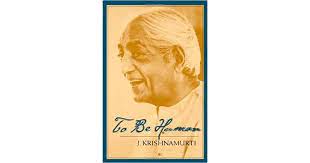To Be Human: Examining the Core of the Teaching
To Be Human: Examining the Core of the Teaching
Thought and Time
With Javier Gomez Rodriguez
November 13, 2022
Zoom Online
Fourteen people were present, all included, to continue our ongoing exploration of J. Krishnamurti’s brief summary of his teaching, which he entitled The Core of the Teaching. This time we were looking into the fourth paragraph, which begins with the statement “Thought is time”. Javier quoted that sentence and then asked a number of questions which probed more deeply into the meaning of K’s words and the ones that followed. Can we perceive the fact of his statement? Can we see that thought is destructive and that knowledge is working against us?
There are different kinds of knowledge – technical and psychological. Knowledge on the technical level is necessary, whereas it brings conflict when the psychological takes the primary position in our actions. Then illusion is predominant. The notion of a self is an illusion and, in that sense, “an enemy”. Thought as the self creates a desire for security while at the same time it destroys security.
In relationship, action based on knowledge (the past) is divisive. For Krishnamurti, the new is truth. Are we alive to the freshness of life in the present? Can we suspend the intrusion of the past, which is the “me”, which is machine-like? Thought and knowledge are always limited, as is memory. We live in conflict as we do not meet the present moment fully.
Javier questioned, along with K , the idea of psychological evolution. Biological evolution may be a fact, but it does not apply to the psychological realm where one can theoretically become a better person. He also tackled the issue of the thinker and the thought. Is the observer different from the observed or are they equally images projected by the mind (thought)? If we see the projections of the “me” and the “you” then they may come to an end and division may cease. This is very important and must be clearly seen. Such seeing will bring about a radical mutation in the mind.
After his opening presentation, Javier opened the floor to group dialogue and discussion. Various questions and perceptions arose from the group participants. Can there be awareness of the human suffering which we cannot avoid? Is this sensitivity strong enough to bring inquiry and a deep questioning of our lives? Can we think our way out of thought? What is the key? It was suggested that what is needed is a quality of perception and insight which sees how thought is operating in our daily lives.
The subject of death and the search for immortality was brought in. “Can the sense of time dissolve?” it was asked. It was pointed out that death and life go hand in hand and are not separate. The challenge of understanding these apparent dualities is a very significant issue for all of us to investigate!
DB


